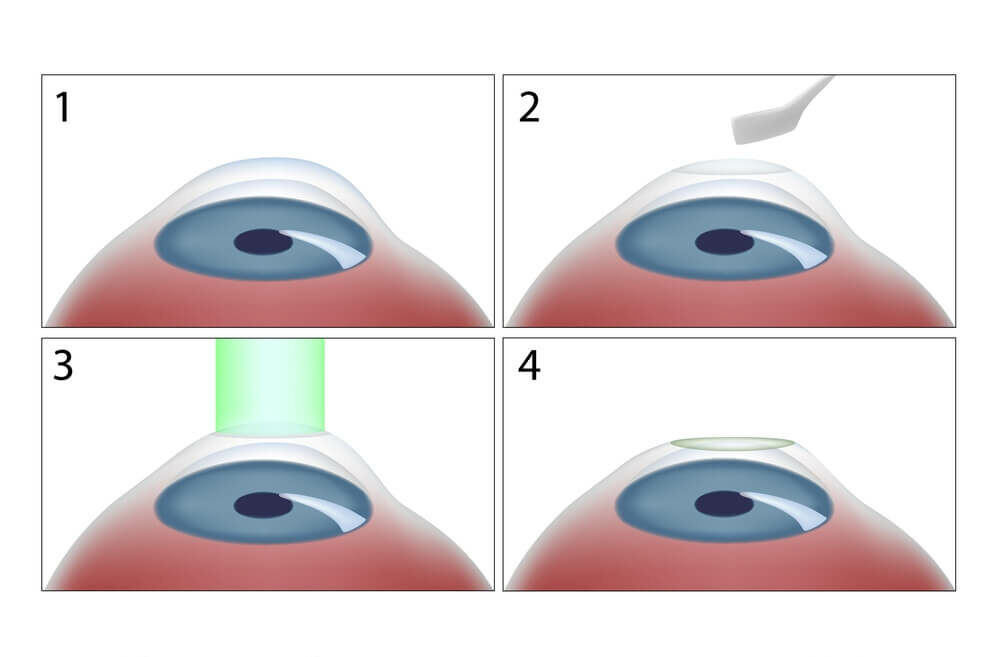Custom PRK (Photorefractive Keratectomy)
PRK was the first laser vision correction surgery to be performed in the United States and Dr. Balin has been successfully performing the procedure for over 20 years. PRK can treat moderate amounts of nearsightedness, farsightedness, and astigmatism.
The PRK procedure offers similar results to LASIK with some advantages over the LASIK procedure. Because PRK is performed without the need to create a flap in the cornea, patients who have thinner corneas or post LASIK patients are better candidates for PRK than they would be for a LASIK treatment. Also since there is no flap created on the cornea, there is no risk of a flap complication.

At your initial exam, Dr. Balin will use a WaveScan device to measure the imperfections in each of your eyes and create a customized treatment plan based upon your unique eyes. In performing a Custom PRK procedure Dr. Balin will gently remove the thin outer layer of the cornea known as the epithelium. This layer will regenerate itself over time as the patient heals. Once the epithelium layer has been removed, Dr. Balin will input your customized treatment plan into the Excimer Laser and guide your treatment. Just as in LASIK, the Excimer Laser will emit cool beams of laser light to vaporize minuscule amounts of tissue to precisely reshape the cornea for clearer vision. Just as your fingerprint is unique, your treatment plan will be unique and customized to only you.
Although PRK has similar results and some advantages over LASIK, it does have a longer visual recovery time than LASIK. As the epithelium regenerates, Patients may experience some blurred vision. Vision will usually improve gradually over a few weeks. There is also more discomfort in the healing process, so medication is needed as you heal.
Frequently Asked Questions on PRK
What is PRK (Photorefractive Keratectomy)?
PRK is a refractive surgery to treat moderate amounts of nearsightedness, farsightedness, and astigmatism.
What is the Difference Between LASIK and PRK?
The difference between the two procedures is in the initial step. In performing LASIK, Dr. Balin will initially create a flap on the cornea which will be lifted to perform the procedure. In performing PRK, Dr. Balin will not create a flap but will instead remove the thin layer on the cornea known as the epithelium. The treatment will then be applied to the cornea. A thin contact lens will be placed on the eye for comfort as you heal. The contact lens is usually removed within a few days. The epithelium will regenerate as the patient heals.
Where is the Procedure Performed?
The procedure is performed at the Balin Eye & Laser Center in our state of the art laser suite located at the Northampton, MA location.
How do I Find Out if I am a Candidate for PRK?
As with all refractive surgeries you need to be at least 18 years of age and have stable vision. Your eyes need to be healthy and free from certain eye diseases. We offer comprehensive pre-op exams where your eyes will be dilated and extensive testing will be performed to determine if PRK is an option for you. This exam is scheduled in the Northampton office. If you wear contacts, you will be instructed to remove the contacts for a period of time prior to the exam. Expect to be at the office for at least 3 hours. Your eyes will be dilated with strong drops that will last for a minimum of 12 hours, but if you are sensitive to the drops you may remain dilated for a longer period of time. You will meet personally with Dr. Balin to discuss all of your results. It is possible that Dr. Balin may recommend an alternate procedure based on your results. There is a $150.00 fee for this exam which is applied toward your surgery.
What to Expect the Day of Surgery?
You should plan on being at our office for about 2 hours. When you check-in for your procedure, we will give you a prescription for pain medicine and a sleeping pill. Your procedure should only take about 20 minutes. Your eyes will be numbed so you should not feel any pain. We will ask you to keep your eyes closed and rest for the remainder of the day. You cannot drive yourself home or drive to the one day post-op appointment. You will need to arrange for a ride.
What Will I Feel During the Procedure?
Your eyes will be numb during the procedure so you should not feel any pain.
What Should I Expect Following the Procedure?
Following the surgery, you will usually experience discomfort that is sometimes described as a stinging or burning sensation. You will be given medication to help with this discomfort. We will see you at one day post-op and then again at a five day post-op appointment. The bandaged contact lens that was placed on your eye to provide greater comfort as you heal will be removed at five days. The remainder of your post-op appointments will be set up based on your healing. Some activities such as eye rubbing, applying eye makeup, swimming and contact sports will be restricted for three weeks. You will also need to wear sleeping goggles for three weeks at night to prevent any rubbing while you sleep. You will need to use drops as you heal.
Is there Financing?
Yes! Please see our financing options.
What is the Cost of PRK?
Although most insurances do not completely cover the procedure cost, there are many insurances that provide some coverage in the form of discounts. We do participate with many of these insurances, so please contact our Refractive Surgery Coordinator for surgical quotes.
What are the Risks of PRK?
Dr. Balin will personally review the risks of the surgery with you at your pre-op candidacy exam. The procedure is considered to be safe and effective but like all surgical procedures, there is always some risk.
How Long do the Results Last?
The correction is a permanent correction to the eye. However, it is possible that your eye could change in the future.
What’s the Next Step?
The next step is to contact our office to schedule your PRK pre-op exam.
Request an Appointment
Or, call our office at 413-584-6666.
Our Refractive Coordinator would be happy to answer any questions you have about PRK.



